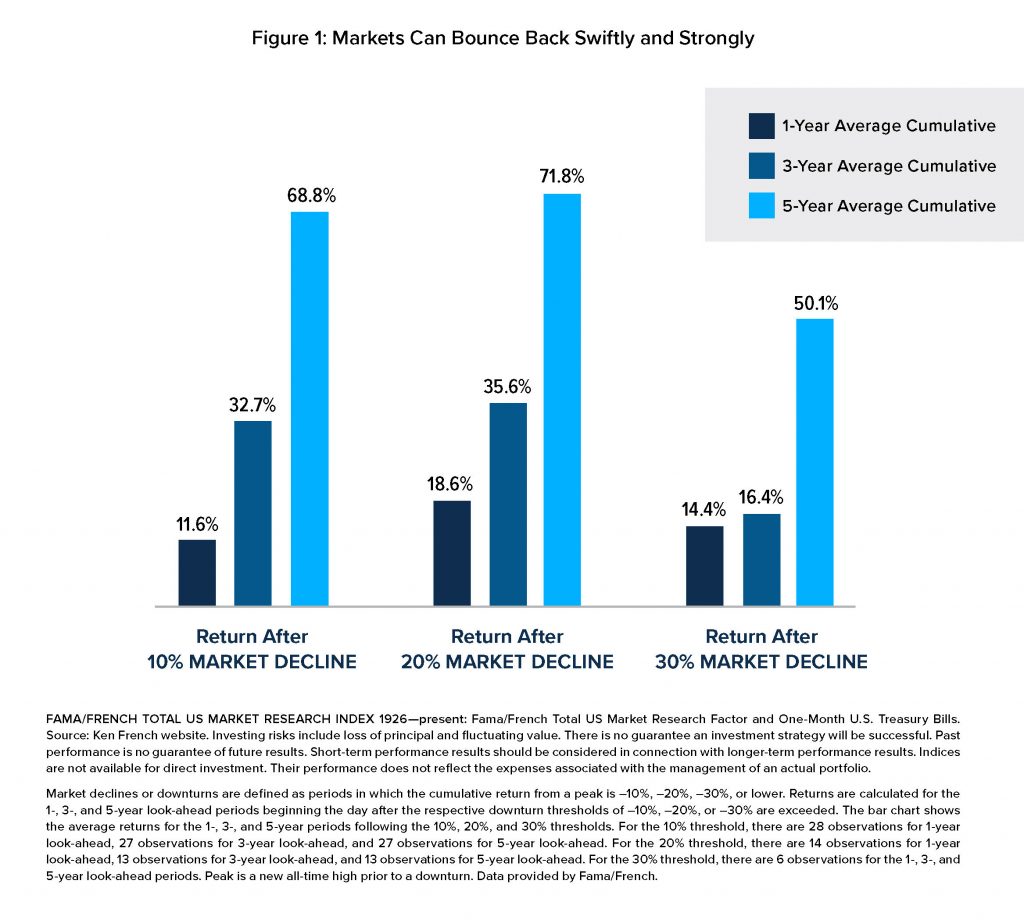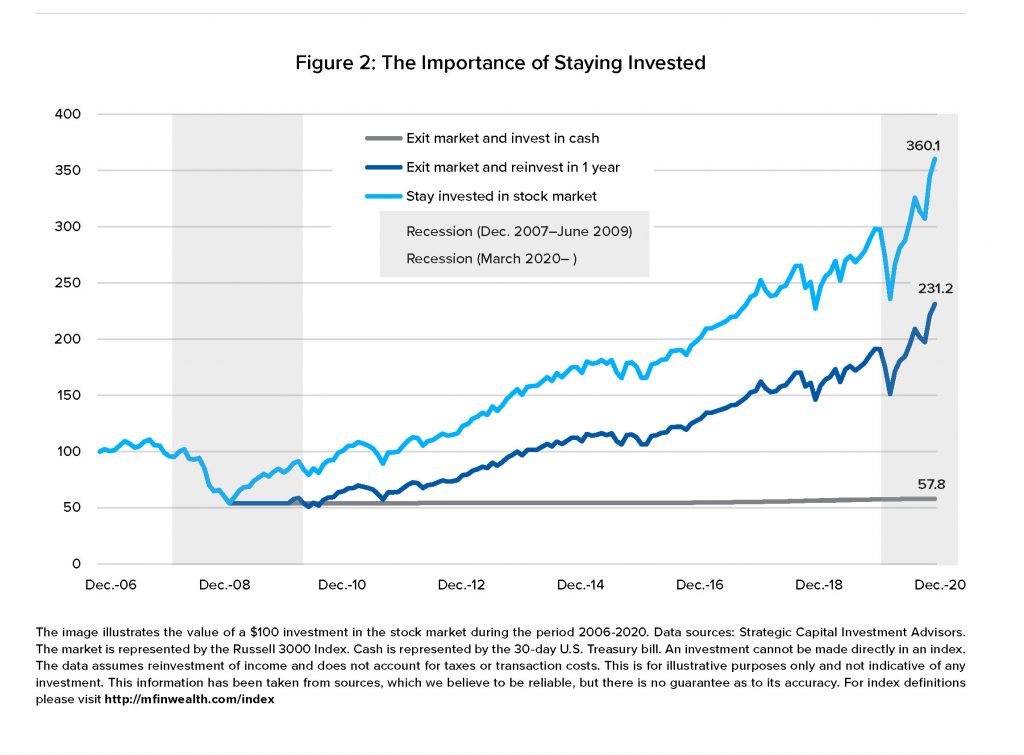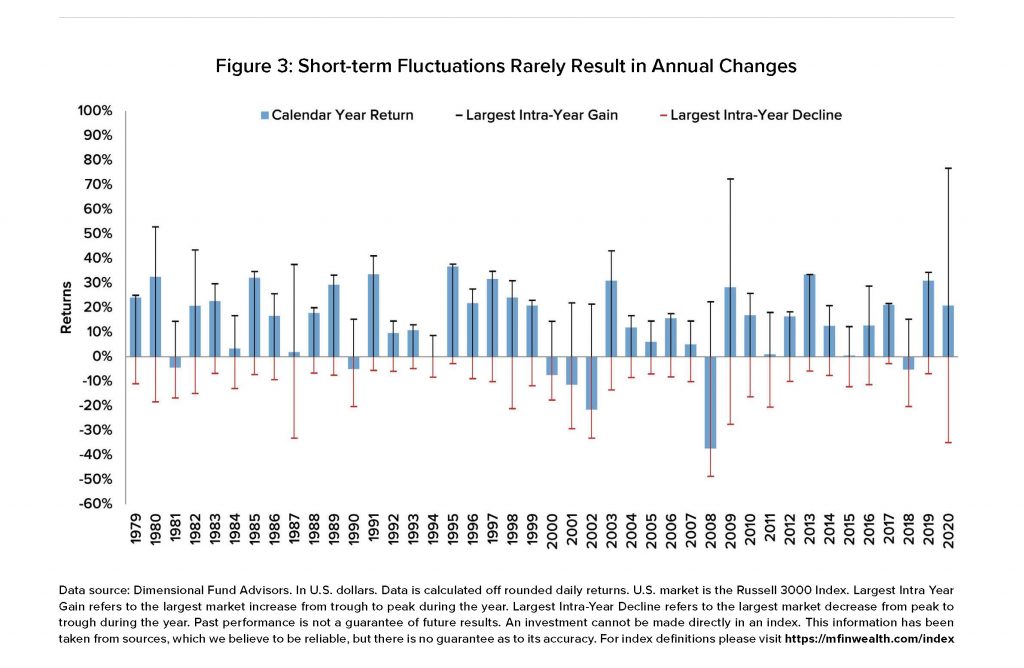Recent market volatility reminds us of the ever-present risks inherent in stock investing. When bear markets occur, many investors instinctively seek shelter on the sidelines. But, as history demonstrates, leaving the market—even temporarily—can be costly over the long-term.
So, what can investors do now to manage current market volatility?
STAY INVESTED
First, it’s important to acknowledge that basic human instincts are at odds with what it takes to invest success- fully over the long term. After all, what did our ancestors do when faced with danger? It was either fight or flight. “Do nothing” probably wouldn’t have been a good strategy, but it’s exactly what most investors should do when a sharp downturn occurs.
BE PATIENT
Patience is key. As Oracle of Omaha Warren Buffett says, “The stock market is a device for transferring money from the impatient to the patient.” When markets
are volatile, either up or down, it’s easy for investors to let emotions like euphoria or fear get the better of them, causing them to make impulsive investment decisions. Being aware of how emotions can impact decision-making is a great first step to avoiding making regrettable investment choices during a market downturn.
RESIST THE URGE TO SELL AT THE WRONG TIME
A well-known cognitive bias humans have is loss aversion. Put simply, people have a stronger negative reaction to losing money than they do a positive reaction to gaining the same amount. How does loss aversion play out for investors? It can cause investors to sell at their most panicked, when stock prices have already considerably declined. When panic sets in and investors are tempted to sell, stop and ask:
- Who is buying my shares?
- Why would they buy my shares?
- Could it actually be a good time to buy?
Asking these questions reminds one that there are two sides to every trade. And the person on the other side may be just as knowledgeable, or more so, on current and future economic conditions. Thinking about the answers to these questions can temper the urge to sell. Bear markets don’t pose the same “danger” that saber- toothed tigers did to our ancestors. Pausing and thinking critically can help overcome the fight or flight instinct.
USE HISTORY AS YOUR GUIDE
Knowledge of how markets have behaved in the past can be a highly effective tool for calming investor emotions or overcoming cognitive bias. What many investors don’t realize is just how quickly markets tend to bounce back after hitting bottom. In Figure 1, an analysis of bounce-backs since 1926 shows that markets tend to rebound swiftly and strongly.

Selling during times of fear can cause investors to miss out on the sizable recoveries that have historically followed downturns. Those who choose to stay invested tend to achieve higher returns over the long-term than those who cash out altogether or who exit the market near its lowest point, only to reinvest a year later (Figure 2).

Short-term volatility can be the wind that whips up investors’ emotions, but as Figure 3 shows, market highs and lows throughout the year are nearly always muted by the time the year ends. In other words, investors may want to resist the urge to sell (or buy) when emotions are running high. Instead, consider staying invested and focused on your long-term plan.

FEEL BETTER PREPARED
Navigating a market downturn is no different than navigating any other challenging event.
Understanding how emotions can impact decision-making and knowing how markets have behaved during previous downturns and afterwards may help investors feel better prepared during periods of market unrest. It is important to remember that investment risk and return are highly correlated. Investors who can tolerate volatility and stay invested will likely receive enhanced returns over time.
This is for informational purposes only and is not an offer or recommendation to buy, hold or sell or a solicitation of an offer to buy or sell any security, sector or other financial instrument, or to participate in any trading strategy. It has been prepared without regard to the individual financial circumstances and objectives of individual investors. The appropriateness of a particular investment or strategy will depend on an investor’s individual circumstances and objectives. Please discuss your questions with your M Financial Professional. This report was prepared by M Wealth and reflects the current opinion of the firm, which may change without further notice. This report is for informational purposes. Nothing contained herein should be considered as investment advice or a recommendation or solicitation for the purchase or sale of any security or other investment. Opinions contained herein should not be interpreted as a forecast of future events or a guarantee of future results. Different types of investments involve varying degrees of risk, and there can be no assurance that any specific investment will either be suitable or profitable for a client’s portfolio. Economic factors, market conditions, and investment strategies will affect the performance of any portfolio and there are no assurances that it will match or outperform any particular benchmark. M Financial Asset Management, Inc. (M Wealth) is a registered investment advisor, and a division of M Financial Group. CONFIDENTIALITY NOTICE: This document is for the sole use of the intended recipient(s) and may contain confidential and privileged information. Any unauthorized use, disclosure, or distribution is prohibited. ©2022 M Financial Group. All rights reserved. #4056457.2 Expires 6/2024
